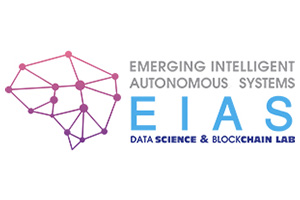
DATA SCIENCE & BLOCKCHAIN LAB EIAS
1. Lab Overview
- Leader: Prof. Mohammed ELAffendi
- Research Focus: The lab specializes in key areas such as AI in cybersecurity, blockchain, data science, intelligent systems, cognitive systems, computer vision, and digital transformation.
- Objectives: To innovate in line with global and national trends, secure research funding, disseminate knowledge, and foster collaborations.
2. Key Achievements
- Publications: 156 publications, including 112 journal papers (26 in Q1, 73 in Q2), 12 conference papers, 15 books, and 17 book chapters.
- Patents: No patents were reported.
- External Funding: The lab secured 4,280,000 SAR in external funding, which includes significant contributions from government bodies and other organizations.
- Software and Platforms:
- 6GSDRONE-OPT: Software for optimizing drone coverage and planning.
- Quantum Platform for Secure Codes: A quantum dynamical system designed for cryptographic applications.
3. Major Research Themes
- AI in Cybersecurity: Developing AI-driven systems to proactively detect and combat cyber threats.
- Decentralized Autonomous Systems and Blockchain: Exploring blockchain’s transformative potential in industries beyond cryptocurrencies.
- Data Science and Big Data: Focusing on cloud computing, mobility, and data-driven decision-making for intelligent cloud systems.
- Deep Learning and Intelligent Systems: Leveraging deep learning for real-world applications, such as image recognition and natural language processing.
- Mixed Reality and HCI: Investigating the potential of mixed reality and holography in human-computer interactions.
- Cognitive Systems and NLP: Advancing natural language processing and cognitive applications, including AI-based assistants and speech recognition.
4. Research Projects
- Adaptive Intelligent Quality Monitoring System for civil aviation services.
- Cybersecurity Incident Response Optimization using machine learning.
- UAV Altimeter Radar for high-precision altitude estimation using AI.
- Establishment of the Center of Excellence in Quantum & Intelligent Computing.
5. Partnerships & Collaborations
- Collaborated with over 20 institutions across eight countries.
- Hosted and organized the Second International Conference on Cybersecurity, Cybercrimes, and Smart Emerging Technologies.
6. Infrastructure
The lab's infrastructure includes advanced computing resources, such as GPU-powered laptops and servers. The lab also has plans to expand its equipment as needed to support research activities.
7. Notable Highlights
- Lab members were included in the Stanford List of the top 2% of scientists in their respective fields.
- Developed multiple AI-driven systems, particularly for drone management and cybersecurity applications.
- Published several research papers in top-tier journals like IEEE Transactions.
